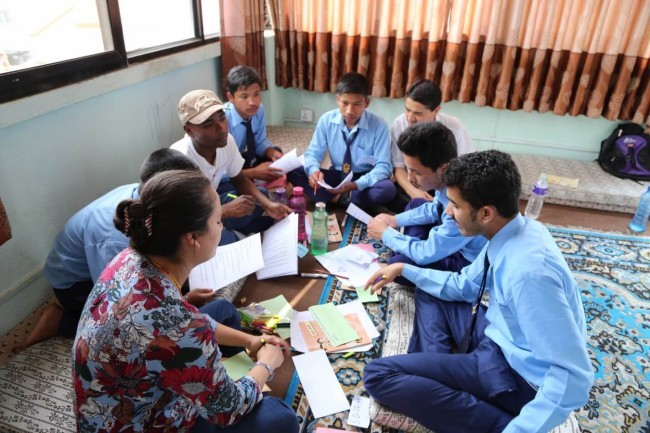"It’s Time To Talk! – Children’s Views on Children’s Work" (hereinafter referred to as - Time to Talk) was launched by Kindernothilfe (KNH), Save the Children Canada, and Terre des Hommes (Tdh) International Federation in March 2016 with an objective to enable working children to have their views heard in local, national and global decision-making processes. The project recognizes working children as right holders with expertise on their own lives, and enables them to engage in each stage of the project cycle as advisers, analysts, and/or their own advocates. This project currently has its Child Advisory Committee (CAC) in different regions of the world:Asia: Bangladesh, India, Indonesia, Nepal, Philippines, Europe: Kosovo, Latin America: Bolivia, Chile, Guatemala, Honduras, Paraguay, and Peru and Middle East: Jordan and Lebanon.
As a part of the Time To Talk project, Asia Regional Training Workshop was held at Hotel View Bhrikuti, the Godavari, Nepal from 21st -24thof January 2019. The workshop was supported by KNH, coordinated by Tdh Nepal and organized by CWISH. The four-day workshop was facilitated by Claire O’Kane and was co-facilitated by Anne Jacob both from KNH. CWISH played the role of the overall management of the event; whereas Tdh Nepal supported the workshop as a facilitating organization. Altogether, there were 21 participants representing partner organizations from Nepal, India, Bangladesh, Philippines, and Indonesia.
The main purpose of the workshop was to share experiences among partners, to discuss lessons learned from the Time To Talk project and to inform planning for the project extension phase till the end of 2019. In addition, it intended to introduce and try out Toolkit II supporting collaborative and child-led advocacy with and by working children, especially in their local and national context.
The integral focus of the workshop was to learn about Toolkit II basically designed to enhance the capacity of facilitators to work with Child Committees/groups to help them plan, implement and monitor advocacy actions. The first day of the workshop emphasized on reviewing the Time ToTalk process and activities through gallery display and experience sharing from partner organizations present at the workshop. The sessions highlighted the use of tools such as “Body Mapping”, “Flower of Support” with CAC members and its benefits in extracting information from the children about their work and situations. The session followed by the introduction to Toolkit II and the next phase of the project. The participants were made familiar with the first part of Toolkit II, Facilitator reflections and preparation and it was practiced within the group.
The next two days of the workshop covered Part II and Part III of the Toolkit II on Supporting collaborative and child-led advocacy and about Strengthening children’s groups and partnerships. These tools were practiced through group work, presentation, role plays, and even dramas. Participants brought different ideas based on their own local context and experiences. At the same time, participants reflected upon the methods and processes previously used in the Time ToTalk process and analyzed those as being the most and the least effective. Apart from the facilitation tools, the financial and administrative procedure for the next extension phase was clarified to the participants.
The maximum use of ice breakers and energizers made the whole workshop lively and entertaining. Further, it helped in building rapport and enhanced cooperation among the participants. The careful attention to more energizing sessions was given considering the significance of such sessions to children while conducting the Time To Talk activities. The workshop was successfully conducted with excellent facilitators and dynamic participants.

